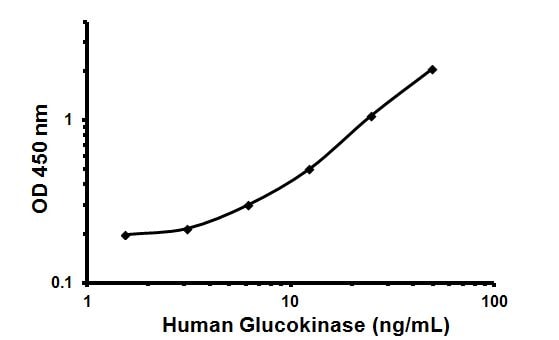Human Glucokinase ELISA Kit (GCK) (ab125967)
Key features and details
- Sensitivity: 0.5 ng/ml
- Range: 0.781 ng/ml - 50 ng/ml
- Sample type: Cell culture supernatant, Plasma, Serum
- Detection method: Colorimetric
- Assay type: Sandwich (quantitative)
- Reacts with: Human
Overview
-
Product name
Human Glucokinase ELISA Kit (GCK)
See all Glucokinase kits -
Detection method
Colorimetric -
Precision
Intra-assay Sample n Mean SD CV% Overall 5.1% Inter-assay Sample n Mean SD CV% Overall 7.4% -
Sample type
Cell culture supernatant, Serum, Plasma -
Assay type
Sandwich (quantitative) -
Sensitivity
0.5 ng/ml -
Range
0.781 ng/ml - 50 ng/ml -
Recovery
96 %
-
Assay time
4h 00m -
Assay duration
Multiple steps standard assay -
Species reactivity
Reacts with: Human -
Product overview
Abcam’s Glucokinase (GCK) Human in vitro ELISA (Enzyme-Linked Immunosorbent Assay) kit is designed for the quantitative measurement of Human GCK in plasma, serum, and cell culture supernatants.
A Glucokinase specific antibody has been precoated onto 96-well plates and blocked. Standards or test samples are added to the wells and subsequently a Glucokinase specific biotinylated detection antibody is added and then followed by washing with wash buffer. Streptavidin-Peroxidase Conjugate is added and unbound conjugates are washed away with wash buffer. TMB is then used to visualize Streptavidin-Peroxidase enzymatic reaction. TMB is catalyzed by Streptavidin-Peroxidase to produce a blue color product that changes into yellow after adding acidic stop solution. The density of yellow coloration is directly proportional to the amount of Glucokinase captured in plate.
The entire kit may be stored at -20°C for long term storage before reconstitution - Avoid repeated freeze-thaw cycles.
-
Platform
Microplate
Properties
-
Storage instructions
Store at -20°C. Please refer to protocols. -
Components 1 x 96 tests 100X Streptavidin-Peroxidase Conjugate 1 x 80µl 10X Diluent N Concentrate 1 x 30ml 1X Standard Diluent 1 x 2ml 20X Wash Buffer Concentrate 2 x 30ml 70X Biotinylated Human Glucokinase Antibody 1 x 90µl Chromogen Substrate 1 x 7ml Glucokinase Microplate (12 x 8 well strips) 1 unit Glucokinase Standard 1 vial Sealing Tapes 3 units Stop Solution 1 x 11ml -
Research areas
-
Function
Catalyzes the initial step in utilization of glucose by the beta-cell and liver at physiological glucose concentration. Glucokinase has a high Km for glucose, and so it is effective only when glucose is abundant. The role of GCK is to provide G6P for the synthesis of glycogen. Pancreatic glucokinase plays an important role in modulating insulin secretion. Hepatic glucokinase helps to facilitate the uptake and conversion of glucose by acting as an insulin-sensitive determinant of hepatic glucose usage. -
Tissue specificity
Isoform 1 is expressed in pancreas. Isoform 2 and isoform 3 is expressed in liver. -
Involvement in disease
Defects in GCK are the cause of maturity-onset diabetes of the young type 2 (MODY2) [MIM:125851]; also shortened MODY-2. MODY is a form of diabetes that is characterized by an autosomal dominant mode of inheritance, onset in childhood or early adulthood (usually before 25 years of age), a primary defect in insulin secretion and frequent insulin-independence at the beginning of the disease.
Defects in GCK are the cause of familial hyperinsulinemic hypoglycemia type 3 (HHF3) [MIM:602485]; also known as persistent hyperinsulinemic hypoglycemia of infancy (PHHI) or congenital hyperinsulinism. HHF is the most common cause of persistent hypoglycemia in infancy. Unless early and aggressive intervention is undertaken, brain damage from recurrent episodes of hypoglycemia may occur. -
Sequence similarities
Belongs to the hexokinase family. - Information by UniProt
-
Alternative names
- ATP:D-hexose 6-phosphotransferase
- FGQTL3
- GCK
see all -
Database links
- Entrez Gene: 2645 Human
- Omim: 138079 Human
- SwissProt: P35557 Human
- Unigene: 1270 Human



.jpg?impolicy=product-thumbnail)


